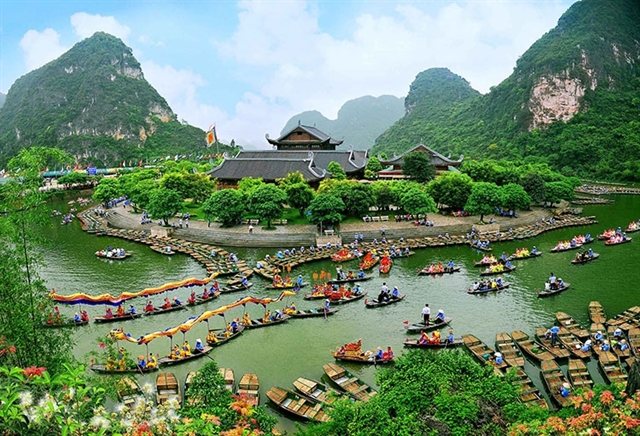 Op-Ed
Op-Ed


|
| A view of Tràng An ecotourism complex in Ninh Bình Province. — Photo baodautu.vn |
My family usually stay at the same hotel when we visit Đà Nẵng. The reason is very simple: my daughter loves the fact the receptionist always offers her candy whenever we stay there.
Even though I’m not very happy about my kid eating candy, I have to admit what keeps us coming back is more about the people.
Then I came across this figure, 70 per cent of foreign tourists who visit Việt Nam (or even more, according to some various sources), don’t return to the country for a second visit.
For a country praised for its endlessly charming beaches and a universally loved cuisine and friendly people, the return rate is quite low compared to neighbouring Thailand’s 50 per cent.
That got me thinking.
In early 2017, the Politburo released a resolution to make tourism one a spearhead economic sector, aiming at attracting 20 million foreign tourists and making tourism account for more than 10 per cent of Việt Nam’s GDP by 2020.
The country’s tourism industry showed impressive growth in 2018 with nearly 16 million foreign arrivals.
But tourism is more than just getting people to visit. It should be about getting people wanting to return.
Out of curiosity, I went online – and I got 96,000,000 results for “never return to Việt Nam”.
The main reasons were scams, environment and traffic, but the people factor was the one that stood out.
Tourists with bad memories of Việt Nam talked about being overcharged, ripped off and badly treated by locals.
Think about it: tourism, more than beautiful landscapes and mouthwatering food, shouldn't it be about the people?
A perfect vacation might include stunning sights and delicious food, but when we step back and think of the experiences that are most precious, it’s the stories that involve the people we meet along the way.
On the opposite side – are most bad travel experiences down to the people?
Are Vietnamese people not as friendly as advertised?
Though many foreign visitors try to be balanced by saying their experiences might not be the norm and they had met some really nice people in Việt Nam, a bad reputation spreads really fast today. You know how.
In 2017, groups of gangsters in Đà Lạt reportedly forced tourists to pay for unwanted products and services. The situation got so bad that the Prime Minister had to step in to stop these actions in Đà Lạt and other tourism destinations.
But the PM can’t step in for every case. For long term benefit, maybe it’s time we think seriously about our tourism policy, starting from the “people” factor first.
The CNN show “Unknown Parts” presented by late chef Anthony Bourdain featured Hà Nội’s famous “cussing noodled” eatery, where the owner serves spicy pig knuckle bún every day. The chef, a middle-aged lady with a cantankerous demeanor, admitted that the stall was more famous for her straightforward, and, at times, outright rude exchanges with customers.
After the documentary is aired, Hà Nội officials thought it was time to stop encouraging these kinds of behaviour and issued a new statement, warning that it will shut down all restaurants which yell or curse at diners.
If the Government wants every Vietnamese people to be a tourism ambassador, maybe it should act to find a way. Good behaviour doesn't just suddenly arrive overnight – clear and transparent regulations need to be put in place.
The tourism sector has a lot of documents on fostering tourism development. They talk a lot about “enhancing the tourism environment”, “friendliness”, “civilised behaviour” and “improving the local image”. But there’s almost no mechanism to make people follow these measures.
People who throw chewing gum on the street in Singapore are fined. If you recycle a plastic bottle in Germany, you're rewarded with one euro. You can’t just tell people to behave properly for visitors, or to persuade them to smile “for the sake of the country’s tourism sector”. You need regulations for them to follow. You can’t blame ordinary people for being rude to tourists – they might be uneducated and it’s the Government’s responsibility to make changes.
In Thailand, the “tourist police” have proved their value in the tourism sector. Their task is to make tourists feel safe, assist them when necessary, eliminate fraud and scams, and contribute to the improvement of the country's image. And I believe it’s not by chance that the country is called the “land of smiles”. It’s not by chance also that the return rate in this country is 50 per cent. Certainly, creative services, infrastructure and other factors play important roles, too. But that’s another story.
It’s fortunate that Việt Nam still has beautiful beaches and an historic culture; that we have the world’s largest cave and UNESCO World Heritage Site Hạ Long Bay. But we must work harder to improve the quality of services for tourists, to offer good value experiences that encourage return visits, increase the length of stay and foster higher daily spending.
My daughter doesn't need much persuading to return to that hotel: just some candy and a friendly attitude are enough. But I bet behind those efforts are the hotel owners. I guess it’ll take way more for Việt Nam’s tourism sector to make tourists want to return instead of sending them home with a bad taste in their mouths of this otherwise beautiful country. But we've got to do it, or lose. — VNS




